A lump or a bump can only be diagnosed by a biopsy. If it isn’t growing and is t problematic you can give it some time to see if it changes. There are cosmetic lesions like warts in people which never require medical attention. Also things like sebaceous adenomas, histiocytomas, etc don’t usually require care. If it gets larger or you are concerned please see your vet in person for an examination for advice.
Hey so a couple of months ago,my dog had a sort of a film that was covering his eye and it has been growing and it seemed like a bother ( I could see his perception greatly reduced. I asked the former owner about it but he told me that it might be age. I overlooked it until it started to become to disturbing, he’s been getting a lot of eye discharge. No matter how much I remove,it simply comes back the following day. I live in a very rural area and there’s no vetinary close and to top it off I’m ina non-english speaking country and I don’t know any other language besides that.so I decided to ask for help, and that’s how I’m here, I also took note that this film is somewhat forming in his other eye,very easy to overlook but I can’t afford to, if anyone can offer some sort of help or advice I would really appreciate it.
Comments
My German Shepherd has a bump on her upper eye lid for about a week and a half and I’m wondering if any one has an idea what it is. I’m wondering if it’s a wart or something. The first picture is how it started and the 2nd and 3rd picture are today.
Comments
I cant get a picture because the website wont work on my phone for some reason but my cat lost one of his whole back claws, there is dried blood along the top of it should i be worried? He is sleeping rn and a little bit ago he was walking around like he wasn’t in pain, is this normal for cats? He got back from the vet about a month ago for an abcess on his neck from one of my other cats being a little too rough and bitting him, could this be the same issue of the cats playing too rough and his claw got ripped out?
Comments
10 year old cat with nasal polyp?
I tried multiple vets and hundreds of dollars but nobody seems to have a solution. One vet said it was an upper respiratory infection, they gave him a shot of Convenia and prescribed Clavamox, nothing. Fast forward a couple weeks, he wasn’t eating for an over a day so we took him to another vet that prescribed Cerenia which helped temporarily. They said he could have trouble smelling his food so he wasn’t eating. But it’s still not gone. Xray was clear. Now the vet referred to a specialist that wants over $2000 to anesthetize and do an endoscopy JUST to diagnose. From Jersey, can I drive 3 hours to MD so you can maybe look a him? I’m scared he’s gonna pass away from troubled breathing.
Background:
He lived with my dad who recently passed and I took him in. In the last year I noticed he has had difficulty breathing but some days it sounds clear, most days it’s worse. It sounds like something is restricting his airway.
He does sneeze often and when he does it’s usually 15+ sneezes in a row like he’s trying to get something out. Last night I counted 21 sneezes in a row. He also sometimes sounds like he’s choking or trying to spit something out but nothing comes out. He does have greenish/yellow boogers once every couple of weeks and also has discharge from his eye.
I know it’s the holidays but I’ll do anything for a chance to help my little guy that reminds me of my father everyday. *Update, just made an appt for 12/30 at 11:30am!
Comments
Colin to Dr. Krista : May I pick your Brains?
Dear Dr. Krista,
I’m writing to ask your advice about a stray cat I found last month. See images attached.
But first I want to thank you for the polyp videos you made, which were refreshing, as well as impressive.
One of my strays was snoring, so I was eager to pluck out a polyp hiding behind his soft-palate. (He didn’t have one, but I’m gratefully alerted for the future.)
Last month I found a stunted stray ginger cat outside a 7/11 in North Thailand, where I’m a self-financed Christian missionary.
Can you help me diagnose, and treat the problem?
At first I thought it was simply FVR / Calici and chronic snuffles.
But when I opened her mouth, she had only 4 teeth in her head!
Yes, she had calici tongue-ulcers, but little sneezing, no ocular discharge, and has been eating like a horse from day one. She’s happy and bright in herself, apart from the ugly sore nose.
Her mandibular Ln were big and hard, so I put her on antibiotic tablets, with a little dexamethasone (actually 2.5mg Prednisolone tab. daily.)
Then after a week or so I sedated her, and examined her mouth more closely, no observable polyps (drat!) but one of her molars was loose and covered in calculus, so I pulled that one out, and cleaned up the remaining molar and two premolars, otherwise the poor thing would have zero teeth.
There was of course gingivitis and pharyngitis, but pink, not red like “dragon-mouthed cats” on dcf.
For the last month I’ve given her a course of floxacilin (30 days) with amoxycillin, and tried all sort of creams on her nose and lower eyelids which. as you can see, are raw and sore.
Her Ln are almost normal now, +but that nose is no better+, and she tries to rub as though it is itchy.
(I made up creams mixing; 10% flours of sulphur, betamethasone, ivermectin, and vaseline)
There’s a temporary lessening at best, but no lasting improvement.
So what is your differential for her?
In NZ where I locummed, cat leprosy was common (Mycobacterium from mice and voles) so that was my diagnosis, but the floxacillin has made no impression.
I’ve trimmed her claws and taped her fore paws to stop her making her nose raw.
I’m stuck, and thought of asking you Doc.
I’d guess she’s 3-4 years old, confident, unvaccinated, entire, lived wild all her life eating left over fast food, and possibly DCF from neighbours.
Since October I’ve been feeding her raw chicken frames, tinned sardines, vitamin syrup, and no DCF.
She loves raw chicken :), and eats whatever I put in front of her and still looks for more.
Apart from her nose you would not think she was ill in any way.
Thanks for your advice.
Colin
PS. For some reason, Depo-medrone has been taken off the market here, not even local vets can get hold of it.
Colin Melbourne English missionary in Asia
https://www.born-again-christian.org/news/
https://www.born-again-christian.org/news/ไทยคริสเตียน/
https://www.born-again-christian.info/aboutus.htm
https://www.born-again-christian.com (Asian languages)
Comments
Hi Krista,
I discovered your YouTube videos yesterday and found your advice on cat care incredibly helpful. My wife and I are caring for our 18-year-old Birman cat, who is in stage 4 kidney disease with significant muscle loss. She’s also struggling with constipation and has other health issues, including high blood pressure and a heart murmur.
Currently, we’re feeding her a mix of wet food (chicken broth, chicken, pumpkin, and egg yolk), and providing SubCut fluids (50ml/day), along with the following supplements:
– Epakitin (0.5g/day)
– Pet-Tinic (2ml/day)
– Lactulose (3ml/day)
– Phos-Bind (0.2g/day)
– Potassium chloride (0.19g/day mixed in the broth – though we’re concerned she’s not getting the full amount since she’s unable to finish the broth).
– In addition, she’s on Amlodipine (0.25ml/day) to manage her high blood pressure.
Despite this, her weight has decreased significantly over the past year. She was once 3.3kg, but a year ago dropped to 2.5kg, and three weeks ago, it dropped again to 1.8kg, despite our best efforts to feed her.
A week ago, we had an enema done at the vet, which relieved some diarrhea, but there was still hardened stool near her anus. We’ve been massaging her abdomen and anus daily to stimulate defecation, and were able to help her pass a large, hard stool last Wednesday. Since then, she’s only passed small amounts of stool – mostly liquid or dark – and has had a lot of difficulty.
Today, we used a Pedia-Lax suppository (1ml), and after about 30 minutes, she passed a larger stool with dark liquid diarrhea. The stool was slightly hard, dark, and very smelly. She’s now very exhausted and resting, but did purr a bit before falling asleep.
For hydration, I gave her 10ml of SubCut fluids before the suppository to prevent dehydration. We’ve seen three different vets, but none have been able to provide lasting relief.
We’re reaching out for advice on whether we’re on the right track and if there’s anything else we can do to help her feel better and poop more easily. Any suggestions, given the circumstances, would be greatly appreciated.
Thank you so much for your time and any guidance you can offer.
Warm regards,
Joel and Sonia
Comments
Hello. My 4 year old male cat had a urinary blockage they did a catheter and unblocked him sent him home and he wasn’t getting better 2 days later took him back and now he has a bladder infection. Sent us home with Amoxocillin. Took him back to er and now he is blocked again. Another catheter is in. My question is if they pull the catheter will he block again due to the bladder infection he still has? My thoughts are can they leave it in longer and keep the urine flowing until his badder infection clears? Lastly the urine culture hasn’t been verified yet to know exactly what antibiotic is needed apparently that takes a week. They just guess Amoxocillin. Please let me know your thoughts.
Comments
My senior, male, neutered, diabetic nebelung cat is experiencing constipation, I had recently slowly changed his diet to a raw based diet from royal Canon diabetic pouches,, as i was put off from the vet scientific diabetic diets in the end due to one day reading the ingredients and seeing that my cat was needing something more or potentially he was lacking something, I say this as he was starting to mirander outside like a Billy goat eating all the graass that he could in our backyard. Coincidently, Boof started flickng his head and scratching at his ears, the next day after noticing his discomfort and that he still hadn’t defecate (day 3) i took him to a neighboring vet as our usual vet was fully booked out, I could see crusty brown specs in his ear and a discharge, the vet I took him to gave, me pmp drops to administer 3 drops per ear twice daily for 7 days. She didn’t want to try to much else due to him being a diabetic and also a new patient,
One day later when I was cleaning boofs bedding a spider
Like bug had come out onto our carpet,
I took a photo of it,
It’s definitely some type of tick not sure if it cpmr from out of his ear or if it has anything to do with his constipation.
Boofs appetite has been great this whole time aswel.
Although after eating I have noticed him somewhat whining ND groverling like his pain 🙁
He also vomited twice after having dinner. (biley foaming substance liquid)
On day 5 I took vet into out normal vet who assessed him, she gave him a 24hour anti nausea injection, and assessed him, she said to resume giving lactolose maybe a little bit more and aswel with the subcut fluids,
And still nothing,….
The vet called today to see how Boof was I explained to her that he wants to go to the toilet but just can’t, and his looking pretty squeamish again,
She explained to me that because of it being 6days now with no bowel movements that it can get Boof pretty sick potentially, she explained that instead of taking a stab in the dark and guess that they would breed to take xrays ect bloods and mannualyl remove all feces that’s stuck in him and it would cost $800. Due to Christmas coming up and the overall rise in the cost of living and the renting crisis here, I am just stuck for money at the moment that kills me to say, I have tried vet pay with. No luck…
Is there anything I can try at home please, it’s not at all a situation where I don’t want to pay anyone, it’s by far the opposite and I’m hoping that a friend of family member will reply to me after asking for a lend, which I never do, and I never would expect or be suprised if anyone can help,
My boy means so much to me,
I just gave Boof a 5ml enema of lactulose and more subcut fluids
Is there anything more that I can do please 🙁 🙁
Comments
My cat got a large lump under his jaw that formed over night. The vets are closed and the emergency vet is too far and expensive. My parents say they will take him monday but is it safe to leave it untreated for two days? *edit, i should mention the lump is large and does not seem to be causing pain, he is acting normal anyway. I cant tell if its warm or not thou
Comments
Have a 7 month old orange tabby. Adopted at 4 months. Has a bout of diarrhea after a long progress of switching him to kitten food instead of adult that was at the shelter (dry, Hills normal kitten). Then harder bowel movements occurred. Small incomplete prolapse occurred. Vet thought could be parasites (none on fecal) and did proactive dewormer. Also started on revolution plus. No improvement, started wet food (hill sensitive stomach kitten). Added water and a probiotic. Perforation continued. Saw vet two weeks later and did another round of dewormed. Said it should resolve on own.
Second opinion at new place. The did manual exam, nothing structurally abnormal. Planned on purse string but then vet consulted and decided conservative measured first. Animax cream and hills I/d. Started to become super constipated. A lot of tummy massages and forced “bicycle” kicks. You could feel the back up. Two week later, switched to hills biome. Did another fecal (negative). Less straining but still harder than average BMs. Continued with adding water and probiotics.
Almost a week ago, did purse string. This poor guy had a bad night the following night after surgery. Only way I can describe it is that it’s almost like a mega colon. He’s able to get highly compacted BMs partly through. I help assist with wiping, warm compresses, warm bath, it’s miserable for the both of us and I thought he’d would burst the stitches or just create a new opening. Finally got most of it to pass. Took back to vet in the am. They could only see a little bit of stool on x-ray but said everything is fine. Upped lactulose to 2mL tid and .75 gabapentin tid. Things were okay until he has to push again. Not as bad but I’m afraid this will be an issue once the stitches are removed in 2 days. Still watering down food, even more since surgery and blended up the biome.
I’m just not sure how to express the compacted BMs are continuing. I had to beg for a CBCw/diff just to ensure there wasn’t a concern for high eos. He drinks great and no concerns with urination. He struggles to eat because of all of this. He’s a little underweight. Super active happy kitty besides all of this.
Any advice on diet, tests, ect that I can bring up to vet? Enema before stitch removal? They do consult a specialist since he’s a kitten and I’m about to ask for a referral. Switch to Royal GI kitten? I just feel horrible that the dude is back and forth in a cone and not fully enjoying his kitten phase. Plus this is putting a strain on our relationship.






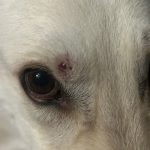
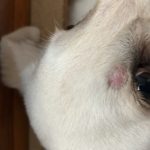
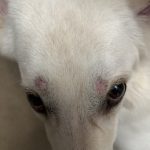

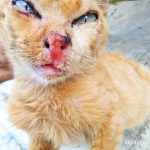
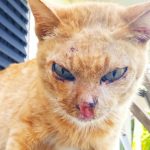
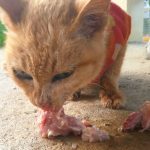
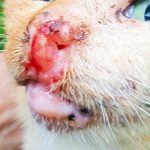
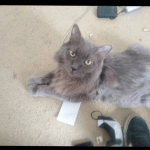
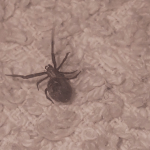
Hello,
I’m sorry but I cannot offer much help here. Even with good photos eye conditions are very difficult to diagnose without seeing them in person.
When all else fails I offer an ophthalmic antibiotic to see if this helps. Too often we struggle with the ability to diagnose (because we aren’t specialists) so we see if response to treatment offers any help. In some cases I might also do an oral antibiotic. This is especially the case for very young or old patients.